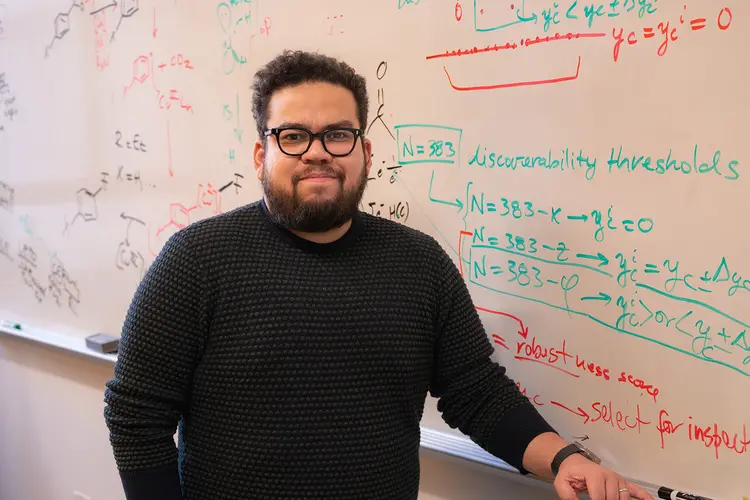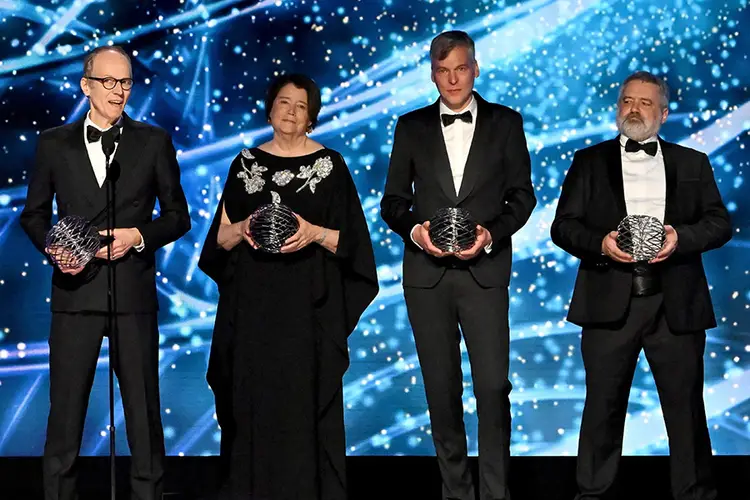
AI’s Role in the Future of Discovery
Barbara Shinn-Cunningham on the expanding role of AI in science
Media Inquiries
Carnegie Mellon University is helping define how artificial intelligence reshapes science — from accelerating discovery to scaling up new technologies. Ahead of the AI Horizons Summit(opens in new window), which brings together researchers, innovators and entrepreneurs, Barbara Shinn-Cunningham(opens in new window), Glen de Vries Dean of the Mellon College of Science and a panelist at the conference, shared her perspective on AI’s role in responsible biomanufacturing and automated science.
Where is AI making the most immediate difference in how research gets done?
AI for science, the use of artificial intelligence to accelerate discovery and problem-solving, is fueling the next wave of innovation in research as well as in how we tackle challenges in defense, security and energy. Advancements in sensing and measurement technologies have led to an explosion of data in the physical and biological sciences. AI is essential for analyzing and interpreting data efficiently at this scale, which is critical for areas like energy grid optimization and materials development for national security.
Beyond data analysis, AI is opening new frontiers in mathematics and theoretical physics, where it helps test ideas and reveal solutions to complex problems. Combined with advances in robotics and automation, AI is not only speeding up discovery but transforming the scientific process in ways that support U.S. strategic interests.
Can you say more about how you see AI transforming the entire scientific process — from basic discovery to scaling up manufacturing?
We are developing autonomous platforms that integrate high-throughput screening with AI-driven modeling. This combination allows us to accelerate discovery, particularly in areas like environmental health, advanced materials and energy systems. Such platforms enable us to rapidly identify solutions to challenges in clean energy, sustainable manufacturing and national resilience.
AI empowers scientists to ask deeper questions and uncover patterns that inform everything from next-generation battery technologies to biodefense strategies. On the manufacturing side, AI is already transforming early stage discovery, shortening the time needed to move from experimentation to scalable solutions. As the technology evolves, we are excited to deepen collaborations with manufacturers to ensure that innovation flows seamlessly from lab to production.
CMU is known for cross-disciplinary work. How does AI enable collaboration across fields like chemistry, computer science and engineering?
CMU’s strengths — machine learning, AI, data science and robotics — are revolutionizing science today. Computational intelligence uncovers patterns hidden in massive datasets and complex, nonlinear dynamic systems, while robotics transforms ideas into action. But by combining these, we can automate discovery itself. At the forefront of this AI-for-science revolution, CMU is shaping this future — and people are eager to join in.
Scientists within the Mellon College of Science hold a significant competitive advantage in this new era. Working side by side with top engineers and computer scientists, our researchers are driving the future of automated science.
In chemistry, computational researchers are revolutionizing drug and materials discovery by integrating molecular simulations with AI and machine learning — enabling expert-level design of novel compounds and accelerating breakthroughs in chemical innovation. In mathematics, faculty are advancing computer-aided reasoning to derive proofs of complex theorems. And in physics, our researchers at CERN’s Large Hadron Collider are developing automated algorithms(opens in new window) to identify in real time which events to store from the 40 million 3D images produced every second by particle collisions.
These innovations mark a historic shift in how science is conducted. The next step is to scale this transformation. To fully realize the promise of AI in science and engineering, we need significant national investment in a system to enable advanced AI, particularly large language models (LLMs), to support research workflows under human guidance. This platform represents the future of discovery: faster, smarter and more collaborative.
Why do you think biomanufacturing is taking root in Pittsburgh, and how does CMU fit into that picture?
The Pittsburgh region offers an integrated ecosystem where foundational science, engineering and scalable innovation work hand in hand. At the center of this ecosystem is Carnegie Mellon, conducting cutting-edge research while translating discoveries into real-world impact.
Deep scientific insight drives effective biomanufacturing. At CMU, researchers push boundaries in ways that show how basic science can rapidly evolve into transformative technologies. By translating foundational discoveries into practical solutions, we accelerate the path from lab to marketplace — delivering tangible benefits to society.
Pittsburgh’s collaborative infrastructure further strengthens this advantage. Partnerships with organizations like BioForge(opens in new window) and the ARM Institute(opens in new window) help scale scientific discoveries into manufacturable solutions. With continued investment, especially in platforms like AI for scientific discovery, Pittsburgh is positioned to lead the next wave of biomanufacturing innovation.
Training the next generation of scientists is a big part of your role as dean. What skills will tomorrow’s researchers need to thrive in AI-powered biomanufacturing?
Carnegie Mellon cultivates analytical thinkers, problem-solvers and innovators. We teach our graduates to think quantitatively, critically and analytically. These skills are indispensable not just in research but in industry.
To thrive in AI-powered biomanufacturing, tomorrow’s researchers will need a dynamic mix of skills that bridge science, technology and innovation. Essential competencies include foundational science expertise, AI and data literacy, engineering and automated science skills, and translational thinking.
Successful researchers will be able to take those skills and partner with computer scientists, engineers and industry experts in interdisciplinary teams. Those teams will also need training to consider the societal impacts of AI-driven innovation including data privacy, safety and equitable access to technology.
Is there a project or partnership you’re especially excited about right now that shows where this field is headed?
One of the most exciting developments is a project called Coscientist, an autonomous system created by Gabriel Gomes(opens in new window). It is the first AI-driven platform able to independently design, plan and carry out a chemistry experiment by understanding natural language. Imagine telling a machine, in plain English, what you want to explore in a lab — and having it figure out the method, run the experiment and deliver the results.
Now imagine scaling up this approach. We’re looking at a future where AI can not only come up with a scientific hypothesis in biology or chemistry but also test them instantly either through high-performance computer simulations or by directing robotic lab equipment. This kind of system could dramatically speed up breakthroughs in clean energy, rapid-response therapeutics and new medicines, materials or sustainable manufacturing methods in weeks or days, instead of years.
It’s a glimpse into a new era of science.



